|
|
|
Sort Order |
|
|
|
Items / Page
|
|
|
|
|
|
|
| Srl | Item |
| 1 |
ID:
175335
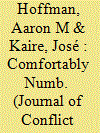

|
|
|
|
|
| Summary/Abstract |
Exposure to a single report about terrorism in the mass media can trigger a range of emotional and political reactions. The consequences of exposure to several terrorism reports in row, however, are a matter of controversy. We examine the effects of prolonged terrorism coverage using an experimental design that combines self-report measures of emotions and political attitudes with instantaneous biometric data on emotions. Consistent with research on nonassociational learning, we find that exposure to multiple videos habituates people to depictions of terrorism: the longer people watch terrorism coverage, the less intense their reactions are to the images of terrorism they see. Some images and videos, however, contribute to this result more than others. This suggests that the ultimate effects of terrorism coverage depend on the interplay between the quantity and quality of reporting, not the quantity alone.
|
|
|
|
|
|
|
|
|
|
|
|
|
|
|
|
| 2 |
ID:
175337
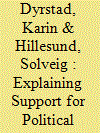

|
|
|
|
|
| Summary/Abstract |
What explains support for violence against the state? The surge in survey-based studies in (former) conflict areas has improved our understanding of the determinants of armed conflict. Yet, the potential interaction between grievances and political opportunity structure has received little attention in microlevel studies. Integrating common arguments from the civil war literature with the political behavior tradition, this article argues that perceived political efficacy, a central component of the political opportunity structure, moderates the association between individual and group grievance and people’s support for political violence. It represents a first individual-level test of the argument that perceived political opportunity structure and grievances combine to explain internal armed conflict. Using original survey data from Guatemala, Nepal, and Northern Ireland (2016), we find robust empirical evidence that support for violence increases with perceived grievance and decreases with political efficacy; and some evidence of an interaction between the two.
|
|
|
|
|
|
|
|
|
|
|
|
|
|
|
|
| 3 |
ID:
175334
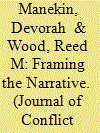

|
|
|
|
|
| Summary/Abstract |
Female combatants play a central role in rebel efforts to cultivate and disseminate positive narratives regarding the movement and its political goals. Yet, the effectiveness of such strategies in shaping audience attitudes or generating tangible benefits for the group remains unclear. We propose and test a theory regarding the channels through which female fighters advance rebel goals. We argue that female fighters positively influence audience attitudes toward rebel groups by strengthening observers’ beliefs about their legitimacy and their decision to use armed tactics. We further contend that these effects directly help them secure support from transnational nonstate actors and indirectly promote state support. We assess our arguments by combining a novel survey experiment in two countries with analyses of new cross-national data on female combatants and information about transnational support for rebels. The empirical results support our arguments and demonstrate the impact of gender framing on rebel efforts to secure support.
|
|
|
|
|
|
|
|
|
|
|
|
|
|
|
|
| 4 |
ID:
175333
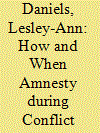

|
|
|
|
|
| Summary/Abstract |
n the difficult process of ending civil wars, granting amnesty during conflict is seen as a useful option, with an underpinning assumption that trading justice for peace is effective. However, is the case? This article tries to bring some clarity to when and how amnesty given during conflict has an impact. Amnesty should have different effects on diverse conflict endings: negotiated settlement, rebel victory, government victory, or conflict reduction. The article also disaggregates amnesties to test direct impacts as an incentive or through reducing the commitment problem, and indirect effects that give military advantage to the government. Using a cross-national data set of amnesties in dyadic conflicts from 1975 to 2011, the research finds that amnesty’s strongest effect is, surprisingly, not as an incentive but rather to reduce commitment problems. It can lead to negotiated settlements but also to government military advantage. The results have implications for negotiations and conflict resolution.
|
|
|
|
|
|
|
|
|
|
|
|
|
|
|
|
| 5 |
ID:
175331


|
|
|
|
|
| Summary/Abstract |
In recent years, the United States has increasingly tried to change other governments’ economic policies by threatening to punish those countries if they do not change course. To better understand the political consequences of these tactics, this paper examines how external threats influence public support for policy change in targeted states. We consider three mechanisms through which economic coercion might alter public opinion: by changing individuals’ interests, by activating their national identities, and by providing them with new information about a policy’s distributive effects. To test these rival explanations, we focus on the case of China–US currency relations. Using data from a survey experiment of Chinese internet users, we find strong support for the informational updating theory. Our evidence suggests that economic coercion can reduce support for policy change because it leads individuals to update their beliefs about who wins and loses from economic policy changes.
|
|
|
|
|
|
|
|
|
|
|
|
|
|
|
|
| 6 |
ID:
175338
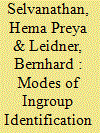

|
|
|
|
|
| Summary/Abstract |
People on both sides of an intergroup conflict undertake various forms of collective action to seek justice for their own group. Three studies investigated whether modes of ingroup identification promoted distinct preferences for justice, which subsequently shaped the form of collective action people supported. Among Arab (Study 1, n = 148) and Jewish Israelis (Study 2, n = 294), we found that ingroup glorification promoted a desire for retributive justice, which predicted support for nonnormative collective action, whereas ingroup attachment promoted a desire for restorative justice, which predicted support for normative collective action. Further, during a period of conflict escalation (i.e., Palestinian protests at the Gaza Strip), emphasizing retributive or restorative justice produced differential effects on the links from glorification and attachment to nonnormative and normative collective action (Study 3, n = 546). This research advances our understanding of when and how collective action can escalate intergroup conflict.
|
|
|
|
|
|
|
|
|
|
|
|
|
|
|
|
| 7 |
ID:
175332


|
|
|
|
|
| Summary/Abstract |
Under what circumstances does terrorism repel foreign investment? The negative effect of terrorism on foreign investment identified in current scholarship masks heterogeneity across host markets and industries. Foreign investment ought to react less to political violence when host markets match firms’ input requirements, when firms lack viable alternative hosts, and when assets are immobile across markets. We model the endogenous codetermination of terror and investment to derive these comparative statics, highlighting empirical challenges in identifying the effects of terror on foreign direct investment. To overcome these obstacles, we use an instrumental variable estimator which exploits differences in the networks along which terror and investment spread. Using industry-level data on the activities of US multinationals, we test our model and conclude that foreign investors that find it hard to leave particular host markets are doubly penalized: their lack of outside options makes them tempting targets for terror. Our findings have implications for other forms of violent and nonviolent political tactics which affect multinationals and for understanding how foreign investment reacts to heightened risk in host markets.
|
|
|
|
|
|
|
|
|
|
|
|
|
|
|
|
| 8 |
ID:
175336
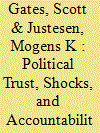

|
|
|
|
|
| Summary/Abstract |
How does armed conflict affect accountability and political trust in democratic governments? To answer this question, we present quasi-experimental evidence based on survey data which, coincidentally, were collected in the days surrounding an unanticipated violent attack by a rebel group in Mali. The chance occurrence of the attack five days into the survey demarcates respondents into two groups surveyed before and after the attack and allows us to examine how the attack affected approval of politicians and trust in political institutions. Our results show that people mainly attribute responsibility to the president and not to parliament or local government, while trust in institutions is largely unaffected. We also show that these effects are strongest in the region of the attack. These findings suggest that voters in new democracies are capable of attributing responsibility to individual politicians and governments while maintaining trust in the fundamental political institutions of democracy.
|
|
|
|
|
|
|
|
|
|
|
|
|
|
|
|
|
|
|
|
|